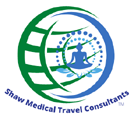Shaw Medical Travel Consultants (SMTC) caught up with licensed clinical psychologist Sonia Wynter (SW) to have a conversation about the impact of frequent traveling on interpersonal relations and relationships. This is a two-part series with the first part written below and the complete interview available on our YouTube channel.
SMTC: How impactful do you view the effects of Travel (personal or business) on the growth of healthy relationships.
SW: There are several variables that can influence the impact of travel on the growth of healthy relationships a few of which are:
- The frequency of travel and the average duration of individual trips.
- The level of commitment to the relationship of each individual; committed versus casual, married, common-law, long-term or recently met.
- Whether or not the couple has children.
- The personalities of each partner.
SMTC: That’s interesting, how would all this impact? Would these act independently or compounding?
SW: Taking all these into consideration however, by and large, it is considerably easier for relationships to thrive when people are physically together – to state the obvious. Human beings are social animals, it’s almost as if “we are hardwired to dislike separation”* .
SWTC: Is there any difference in the impact depending on the amount of time spent apart or together?
SW: For those relationships where travel results in the couple spending more time apart than together, the impact can be significant in that it can compromise not only the health of the relationship but the mental and physical health of each individual and any children in their family.
* Nadine Kaslow, professor and chief psychologist in the department of psychiatry and behavioral sciences at Emory University School of Medicine in Atlanta, Ga.
SWTC: In this day and age of global commerce and travel, in your experience, what are the effects on the traveler and on the non-traveler?
SW: The emotional ramifications on the traveler can include intense feelings of guilt, disconnectedness and even anxiety for some. Unfortunately for many travelers, these feelings often remain contained for the duration of their trips and find voice on their return home with destructive results for their relationship with their partner. Added to this is the physical consequences of stress related to jetlag and fatigue if the traveler fails to develop a consistent and effective mechanism for recuperation.
SWTC: And what about the non-traveler often left behind? What are the emotions they might be experiencing?
SW: For the non-travelling partner and other members of the family, there often arises feelings of abandonment, resentment, anger and loneliness and there are times when efforts to cope with these difficult feelings result in disorders or other consequences which negatively impact the stay-at home individual’s quality of life, including of course, the quality of their relationship.
Tune in to hear the rest of this information packed conversation with Ms. Sonia Wynter to hear her answers to these and other questions and learn how to cope:
3) What are if any the long-term effects of chronic traveling on personal growth and on relationship building?
4) Are there any tips that either party in the relationship can do to maintain a health and sustainable relationship.
5) Is it healthy for parties in the relationship to take personal sojourns away?
Ms. Sonia Wynter

Founder and principal psychologist at Tea House Therapy (THT) in Kingston Jamaica, Licensed Clinical Psychologist Sonia Wynter holds a BSc. (Hons) in Computer Studies and Accounting and an MSc (Distinction) in Clinical Psychology from the University of the West Indies. Ms. Wynter pursued further training in couples and premarital counseling from the Gottman Institute in Seattle WA. Utilizing evidenced based interventions, her expertise in strengthening individuals’ ability to relate better to themselves and those they love through her unique compassionate, cutting-edge approach is highly regarded. THT is a private practice addressing the emotional and mental health challenges facing adults and couples, focusing not only on individuals but also groups in both local and international settings.
The extensive career of Ms. Wynter includes functioning as a clinical therapist at the UWI Center for HIV/AIDS Research, subsequently at the Mico Youth Counseling, Resource and Development Centre in addition to positions within the Psychiatry Department at the University Hospital of the West Indies.
Contributing to her experience dealing with personal interactions, prior to focusing in the field of psychology, for 20years Ms. Wynter worked in the financial industry. After holding roles in various departments including ITC, Financial Control, Trade Finance, and Training and Human Resources, Ms. Wynter was promoted to Resident Vice President, Human Resources at Citibank, Jamaica. She has subsequently held many corporate positions as an HR consultant to financial institutions, telecommunications corporates, manufacturing and distribution conglomerates, legal firms and private medical practices.
Ms. Wynter has authored research papers on the transmission of family values in Jamaica, the impact of child shifting on the Jamaican domestic workers and the psychological defenses embattling those affected by HIV/AIDs in Jamaica.






